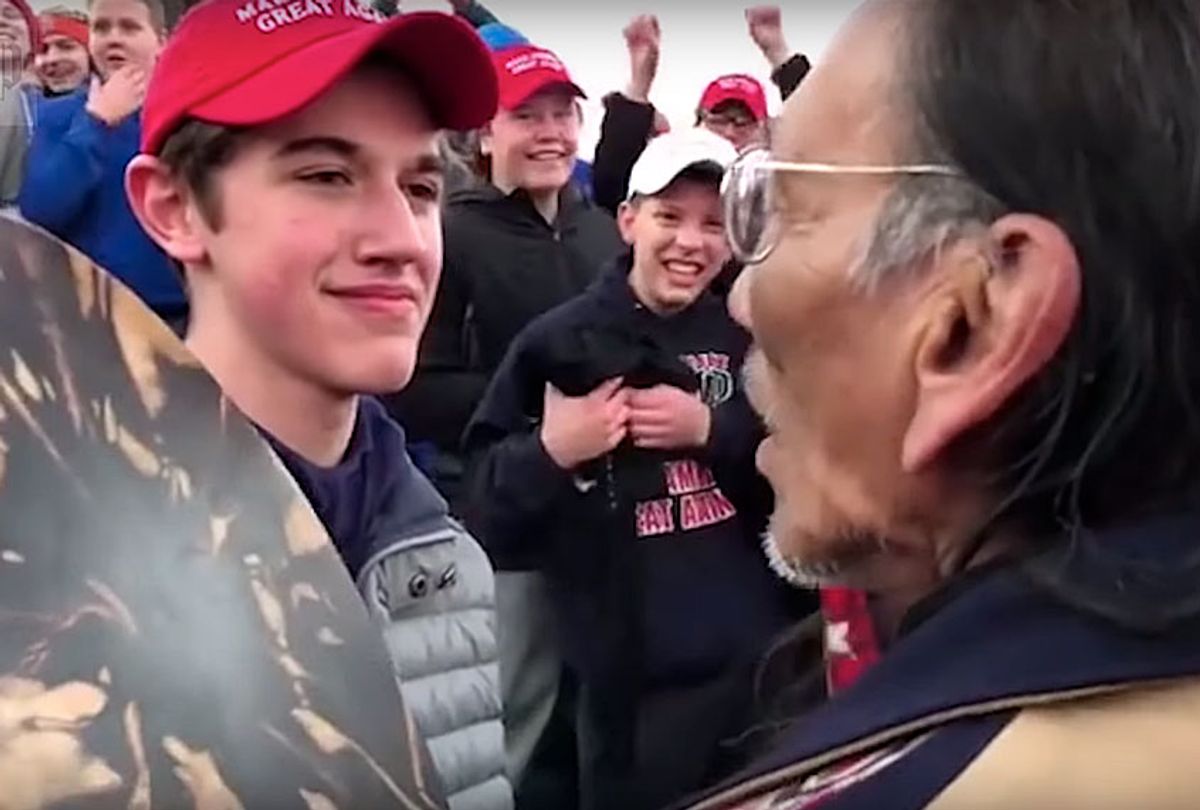Could President Donald Trump, Justice Clarence Thomas and a Kentucky teenager make it harder for liberals to criticize conservatives by redefining what constitutes defamation in the United States? Nick Sandmann appears determined to do that.
The Covington Catholic High School student whose confrontation with a Native American elder named Nathan Phillips went viral last month is suing The Washington Post for $250 million by alleging defamation, according to The Hill. Sandmann claims that the Post's coverage of the story — in which Sandmann was seen wearing a "Make America Great Again" baseball cap and smirking after Phillips approached him — constituted "a series of false and defamatory print and online articles." It also claimed that the newspaper covered the story in a way that disparaged Sandmann because it had a bias against Trump and viewed Sandmann as "a pawn in its political war against its political adversary."
In a similar story, Thomas has argued that the Supreme Court should reconsider its landmark First Amendment ruling in the 1964 case of New York Times v. Sullivan because "if the Constitution does not require public figures to satisfy an actual-malice standard in state-law defamation suits, then neither should we." While it is unclear what specifically prompted Thomas to make his comments, they intersect conveniently with the arguments made by Sandmann as well as with Trump's own well-documented hostility toward the media.
That hostility, incidentally, was evident in Trump's tweets on Wednesday.
"The Press has never been more dishonest than it is today. Stories are written that have absolutely no basis in fact. The writers don’t even call asking for verification. They are totally out of control. Sadly, I kept many of them in business. In six years, they all go BUST!" Trump tweeted at one point on Wednesday.
Despite the impassioned feelings of Trump, Thomas and Sandmann, the trio may have an uphill battle in making it more difficult to criticize public figures.
"He's got a very, very tough burden to overcome... and should," Georgetown University law professor Frederick M. Lawrence told Salon. "The standard is that — particularly when the media is involved but really anybody who is being sued for commenting on a public figure or about a public issue or even a public figure who inadvertently becomes a public figure — the plaintiff has to show actual knowledge of falsity or reckless disregard for the truth. Reckless disregard for the truth doesn't just mean really bad negligence. Reckless disregard for the truth means you had actual doubts about the truth of the information and you consciously disregarded a substantial likelihood that that was false. So it's meant to be a very, very high standard."
Lawrence said that Sandmann seemed to be aware of what the standards are for demonstrating defamation which meant that, unlike Thomas, he isn't challenging the legal status quo so much as arguing that his case falls under it.
"He doesn't suggest that shouldn't be the standard, so he thinks he can meet that," Lawrence explained. "So more power to him. But it's a very hard standard and I'd be very surprised if The Washington Post proceeded here with knowledge of falsity about what they said or with reckless disregard. They might have gotten it wrong, but that's not reckless disregard for the truth."
Harvard law professor Alan Dershowitz had a different view.
"I think they have a reasonable case, I mean the world was guilty of libel," Dershowitz told The Hill. He added, "These poor kids seemed to be doing exactly the right thing, and then suddenly because they are thought to be white, privileged kids, suddenly everyone's ganging up on them."
Lawrence also had harsh words about Thomas' decision to try to undo New York Times v. Sullivan.
"I think it's misguided," Lawrence explained. "I actually am grateful to Justice Thomas for giving me the occasion to go back and reread Justice Brennan's opinion in New York Times v. Sullivan from 1964. I think it's as true today as it was then. Justice Brennan talks about the need for the First Amendment to give what he calls 'breathing space' around free expression rights. And what he meant by free expression rights was the right to criticize public officials, the right to speak about public figures and about public issues, the right to express opinions. And in order to create that breathing space you have this heightened standard for defamation, for actual malice and that means knowledge of falsity or reckless disregard for the truth."
Arthur Ochs Sulzberger Jr. also had harsh words about Trump's attempts to discredit the free press in a statement on Wednesday.
The phrase “enemy of the people” is not just false, it’s dangerous. It has an ugly history of being wielded by dictators and tyrants who sought to control public information. And it is particularly reckless coming from someone whose office gives him broad powers to fight or imprison the nation’s enemies. As I have repeatedly told President Trump face to face, there are mounting signs that this incendiary rhetoric is encouraging threats and violence against journalists at home and abroad.

Shares